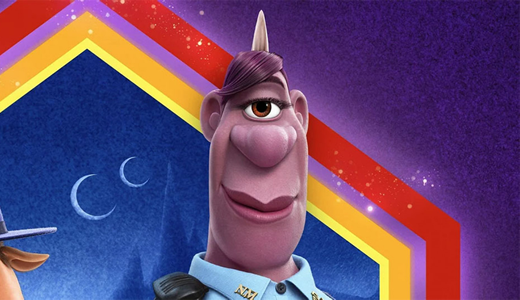“My girlfriend’s daughter got me pulling my hair out.”
If you’re not paying very close attention while watching Disney/Pixar’s new animated movie Onward, you’ll very likely miss that line. And, out of context, you might think, “Why would anyone care about this innocuous sentence?” Answer: Because it’s delivered by a female character, a policewoman to be exact.
Onward’s quiet nod to a gay character has been greeted with both celebration and frustration among secular media outlets. Slate’s Sam Adams, for example, heralded the cough-and-you’ll-miss-it line as proof that the moviemakers are treating gay characters as a normal part of life. He writes,
That line isn’t the point of the scene. In fact, it goes by so fast you could barely notice it. But that’s why it works so well. The film doesn’t pause to let it sink in or isolate the moment with a cut for emphasis. It passes unremarked, because in this world, it’s accepted as a fact of life. Some babies have two daddies, and some babies have two mommies, even if those mommies happen to be centaurs or elves.
Others, however, chastise parent company Disney for not going far enough down this path. The Wrap’s Alonso Duralde suggests that Disney and Pixar’s token nods to LGBTQ characters are added in such a way that they can be easily edited out for more culturally conservative foreign markets:
For many queer viewers, these blips of inclusivity are not cause for a pride parade. These characters are steps in the right direction, to be sure, but they are baby steps, ones that can easily be snipped or dubbed over in foreign territories.
But cultural progressives aren’t the only ones grappling with how to think about these representations. Pro-LGBTQ depictions in entertainment, particularly entertainment aimed at kids, are also challenging Christians who hold traditional, biblical convictions regarding sexuality and marriage. And they’re forcing us into what, for many of us, feels like a premature decision: How are we going to talk about this issue with our kids?
Increasingly, we’re seeing LGBTQ representation on the big screen and smaller ones, too. Sometimes the depictions of gay characters is relatively subtle, as with Onward. Elsewhere in popular culture, however, pro-gay characterization are not only impossible to miss, sometimes they’re the main point. Focus on the Family culture and policy analyst Jeff Johnson recently wrote about the new show Princess Alexander, which “targets kids ages six to nine and is an allegory for LGBTQ+ acceptance.”
And this cultural trend seems to be accelerating, showing up on shows like PBS’s Arthur (which featured an entire episode devoted to a same-sex wedding), an episode including “two mommies” on PBS’s Clifford the Big Red Dog, as well as reports that Sony’s forthcoming Cinderella film will feature a gender-free Fairy Godmother and a bisexual Spider-Man in its next iteration of that franchise.
As a parent of kids between the ages of 9 and 13 myself, I sometimes feel frustrated that our entertainment culture is so fixated on this issue, that it’s so stridently advocating a position that’s at odds with what I’m trying to teach them. It’s tempting for us to passively avoid it—to slip into denial and hope this trend will somehow run its course.
But that doesn’t seem to be happening.
Because of that, the question Christian parents must grapple with isn’t if we’re going to address this important issue. Rather, it’s when and how. Mainstream culture has an agenda that’s slowly saturating children’s programming as well as entertainment media aimed at teens and adults. And if we don’t move intentionally and purposefully into this conversation with our kids, be assured that the culture is already doing so—aggressively.
We have another choice, of course: We can simply avoid movies, music and television shows that contain these messages. But we can’t do so forever. As Adams wrote in Slate, same-sex relationships are an increasingly “accepted fact of life,” and if your kids aren’t watching movies that contain it, they’re exposed to it at school. Or at the park. Or on the beach. And remember, we’re not in a position to monitor our children’s choices forever. If we don’t talk about these issues now, they’ll still make their own decisions later.
That may not always feel like a comfortable conversation, or one they we feel like we’re ready to have with our kids. But the culture’s having that important “talk” with our kids already, whether we’re ready or not.
If you’re not sure where or how to begin to wade into this sensitive issue, Focus on the Family is here to help. The following articles will help jumpstart those conversations:
How to Talk to Your Children About Homosexuality
How to Teach Your Children About Marriage
Raising Children Who Honor Marriage
The Talk: Healthy Sexuality Education—Basic Goals and Guidance from Focus on the Family






Recent Comments